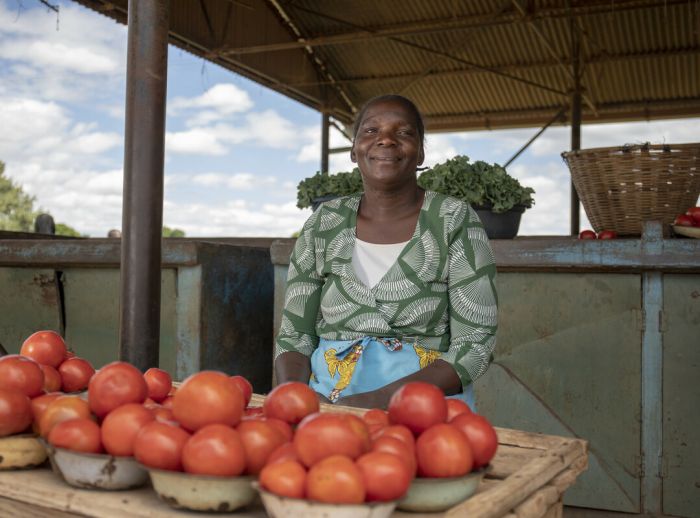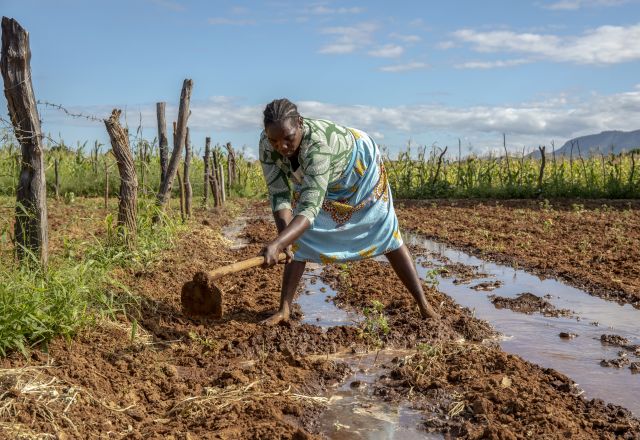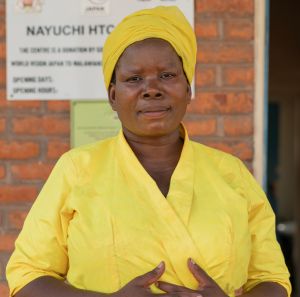
Sarah, a dedicated farmer, relies on her land to provide for her family and send her children to school.
Over the years, she has witnessed changes in rainfall patterns and the devastating impact of cyclones on her crops. However, thanks to initiatives like the Nyanyadzi irrigation scheme and support from organisations like Oxfam and DP, Sarah has been able to protect her crops and ensure a steady water supply. In this blog post, we delve into Sarah's experiences and explore the challenges and resilience of farming in the face of climate change.
"When it used to rain, all the canals would be covered, leaving us without water for weeks. However, with the help of Oxfam and DP, the canals were fixed, preventing silt from blocking them. This year, we had a consistent water supply, and our crops thrived."
Changing Rainfall Patterns
Sarah highlights the significant changes in rainfall patterns over the past 25 years. Unpredictable rains, late arrivals, and even droughts have affected planting and harvest seasons, making it challenging for farmers like Sarah to thrive. Livestock is also impacted, leading to hunger and loss.
The Importance of Water
Water is a vital resource for every living creature, and it plays a crucial role in farming. Sarah explains how the rehabilitation of the Nyanyadzi irrigation scheme and the fixing of gabions to prevent silt buildup have helped ensure a continuous water supply. With improved water flow, Sarah's crops have been protected, reducing the risk of shortages and enhancing overall productivity.

Empowering Women in Agriculture
Sarah proudly shares her journey as a female farmer, taking charge of managing everything after her husband's passing. She emphasizes that gender is not a barrier to success in farming and stresses the importance of equal opportunities and resources for all farmers, regardless of gender.
Learning and Adaptation
Farmers like Sarah participate in workshops and field visits organized by agricultural organisations and non-governmental entities. These platforms provide valuable knowledge on innovative farming techniques, crop diversification, and sustainable practices. Sharing experiences and learning from other farmers help them adapt to changing circumstances and improve their yields.
Coping with Natural Disasters
Sarah recounts the devastating effects of cyclones, specifically Cyclone Eline in 2000 and Cyclone Idai in recent years. These extreme weather events caused the flooding and destruction of fields and homes. While Sarah's area was not severely affected, neighbouring regions faced significant losses. Proper infrastructure, such as fixed drains and constructed pools, have proven effective in mitigating the damage caused by floods.
The Need for Further Support
Sarah acknowledges that despite occasional assistance from organizations, farmers often lack support and resources. Access to quality seeds, fertilizers, and infrastructure maintenance remains a challenge. Sarah hopes for continued support and assistance, particularly in addressing issues with the local electricity supply, which impacts the community's well-being and productivity.

Sarah's story sheds light on the realities faced by farmers in the midst of climate change.
While challenges persist, the resilience and determination of individuals like Sarah demonstrate the potential for sustainable and adaptive farming practices. By addressing the issues of water scarcity, unpredictable weather patterns, and gender inequality, we can support farmers in securing their livelihoods, nourishing their communities, and building a more resilient agricultural sector for the future.




